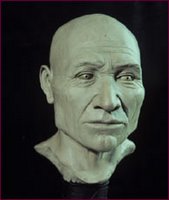 It's amazing a 9000 year old skeleton could raise a ruckus in modern America. If you recall, 'Kennewick Man' was found in Washington state in 1996 and was an amazingly intact specimen, rare for such a crusty old relic. But it didn't make news for that, rather it was the assertion that it's bones did not resemble those of locals thought to inhabit the area during that time period. This represented an immediate conundrum.
It's amazing a 9000 year old skeleton could raise a ruckus in modern America. If you recall, 'Kennewick Man' was found in Washington state in 1996 and was an amazingly intact specimen, rare for such a crusty old relic. But it didn't make news for that, rather it was the assertion that it's bones did not resemble those of locals thought to inhabit the area during that time period. This represented an immediate conundrum. The local Indian tribes wanted KM immediately re-buried, their rationale being that any remains pre-dating Lewis and Clark had to be of Indian origin. Besides, there was a law requiring it. Scientists pitched a hissy since it could not be determined if the skeleton was indeed indigenous, which landed KM in court (well, not the actual skeleton). He remains above ground.
Now a researcher claims the skeleton was probably initially buried, which is significant because:
A team of 20 forensic scientists has been studying the skeleton, he said, and have concluded that the skull doesn't match those of Indian tribes living in the area.In other words, if he didn't "wash up" on the beach it suggests he was either there before the local Indians, or that folks in 7000BC celebrated diversity a lot more than we imagined.
The case also presents lots of interesting bylines. For example, if Kennewick Man wasn't of Indian origin (current thinking is that he wasn't European but perhaps a Pacific Islander derivative) it certainly alters the scientific conventional wisdom about North American migration patterns plastered all over our children's textbooks:
"We know very little about this time period. Who the people were that were the earliest people that came to America," Owsley said. "We are finding out they were coming thousands of years earlier than we had thought," arriving not just over the Bering Strait but by boats and other means.Frankly, I'm surprised we haven't seen more discussion on ole KM. On second thought, no I'm not. There's a touchy racial angle, a touchy Indian rights angle, and a rather touchy scientific reality that widely accepted theories and doctoral dissertations can sometimes exist on fragile ground.
As for me, I've always been fascinated by the single source theory of modern man's origin and it's relationship to the population of the Island nations. Maybe further research on KM will help shine more light on man's pre-historic maritime abilities. Or something else entirely.
UPDATE 3/5/06
CNN.com has a promo of the upcoming Time Magazine article about KM right here.

2 comments:
Last paragraph sums up the problem perfectly. . . I'd like to know how the pacific islanders got there in the first place. *ponders*
If the KM got there via boat, that means there were capable sea-faring vessels available over 9000 years ago, since he was supposedly an immigrant.
What happened to those great sea captains?
Post a Comment